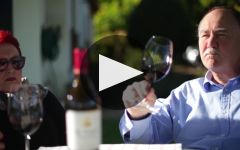De Toren Z 2017
-
Wine
Spectator -
Robert
Parker



Product Details
Your Rating
Somm Note
Winemaker Notes
This wine is a very versatile food pairing wine due to its great acidity and weight. It works exceptionally well with very fine spicy foods. Its aromas of mulberries and blueberries perfectly complements rich fish, lamb, duck, beef and poultry.
Blend: 47% Merlot, 14% Cabernet Franc, 19% Cabernet Sauvignon, 13% Malbec, 7% Petit Verdot
Professional Ratings
-
Wine Spectator
This shows lots of fruit, with red and black currant, cocoa and damson plum notes, all backed by ripe but firm tannins. It is balanced and shows good depth, but this is for the fans of the riper style. Drink now through 2027.
-
Robert Parker's Wine Advocate
Beginning with bold, expressive black fruit aromas in the glass, the 2017 Z offers juicy, blackberry essence with a dusty frame that is an instant success. Medium to full-bodied, the wine shows a balanced structure, with hints of reduction across the mid-palate that will allow this wine to age well past its 10th birthday. Concluding with a long-lingering and juicy finish, De Toren was absolutely able to capitalize on this fantastic vintage. Bravo!
Rating: 91(+?)
Other Vintages
2018-
Robert
Parker
-
Wine
Enthusiast -
Robert
Parker
-
Wine
Spectator -
Wine
Enthusiast
-
Wine
Spectator -
Wine
Enthusiast
-
Wine
Spectator
-
Robert
Parker -
Wine
Enthusiast -
Wine
Spectator
-
Wine
Enthusiast
-
Wine
Spectator
-
Wine
Enthusiast










De Toren proprietors Emil and Sonette den Dulk left Johannesburg in 1991 to establish their vineyards in the Polkadraai Hills of Stellenbosch. Situated on southern facing slopes overlooking False Bay, De Toren enjoys the cooling effect of constant ocean breezes. Taking a holistic approach to keeping vineyard soils healthy and balanced, viticulturalist Ernest Manuel employs sustainable farming practices throughout the property. Infrared Aerial Imaging is used extensively in order to monitor ripeness in various vineyard blocks and determine optimal picking times, although actual harvesting and production are done almost entirely by hand.
The winery is operated on gravity flow principles; a 4000 liter pressure tank in an elevator shaft (the "Tower" from which the winery takes its name) is cleverly used to exploit gravity in transporting wine between tanks and barrels without the use of mechanical pumps. As a result of De Toren’s innovative, minimal intervention production methods, their wines were among the first South African bottlings to qualify for IP (Integrated Production) certification by the Wine and Spirit Board.
The Den Dulks and winemaker Albie Koch seem to have found the key to success with their simple winemaking philosophy: gentle handling, no pumps, and minimum manipulation. Armed with this winning formula, the boutique farm has quickly risen to the ranks of South Africa’s winemaking elite with their duo of dazzling, stylish and complex five-varietal Bordeaux blends: the flagship Fusion V (which debuted in the 1999 vintage and has been hailed by Wine Spectator as "a consistently polished, outstanding Cabernet Sauvignon-based blend") and the Merlot-based "Z," introduced with the 2004 vintage.
In 2018 upon Emil’s decision to take a step back, Daniel Mueller, Cedric Schweri, Albie Koch and Cape Estate became the majority owners.
De Toren has been in conversion to become Ecocert Certified Organic, with 2019 marking the third year of the three-year required transition period. The winery has always believed in sustainable farming but the more research they conducted on soil health the more they became certain that organic production was the best course forward to ensure long term well-being. This shift will help to progressively stimulate the soil’s health which in turn enables greater plant growth, increased immunity and self-protection to produce even more balanced and complex berries.

One of the world’s most classic and popular styles of red wine, Bordeaux-inspired blends have spread from their homeland in France to nearly every corner of the New World. Typically based on either Cabernet Sauvignon or Merlot and supported by Cabernet Franc, Malbec and Petit Verdot, the best of these are densely hued, fragrant, full of fruit and boast a structure that begs for cellar time. Somm Secret—Blends from Bordeaux are generally earthier compared to those from the New World, which tend to be fruit-dominant.

South Africa’s most famous wine-producing district, Stellenbosch, surrounds the historic town with the same name; fine winemaking here dates back to the late 1600s. Its valleys of granite, sandstone and alluvial loam soils between the towering blue-grey mountains of Stellenbosch, Simonsberg and Helderberg have the capacity to produce beautiful wines from many varieties. The climate is warm Mediterranean, tempered by the cool Atlantic air of nearby False Bay.
Perhaps most well-known for its Pinotage and Bordeaux blends, Stellenbosch also produces noteworthy wines from Syrah, Chenin blanc, Chardonnay and Sauvignon blanc. The district’s wards—Banghoek, Bottelary, Devon Valley, Jonkershoek Valley, Papegaaiberg, Polkadraai Hills and Simonsberg-Stellenbosch—all produce distinctive wines from vines with relatively low yields.
